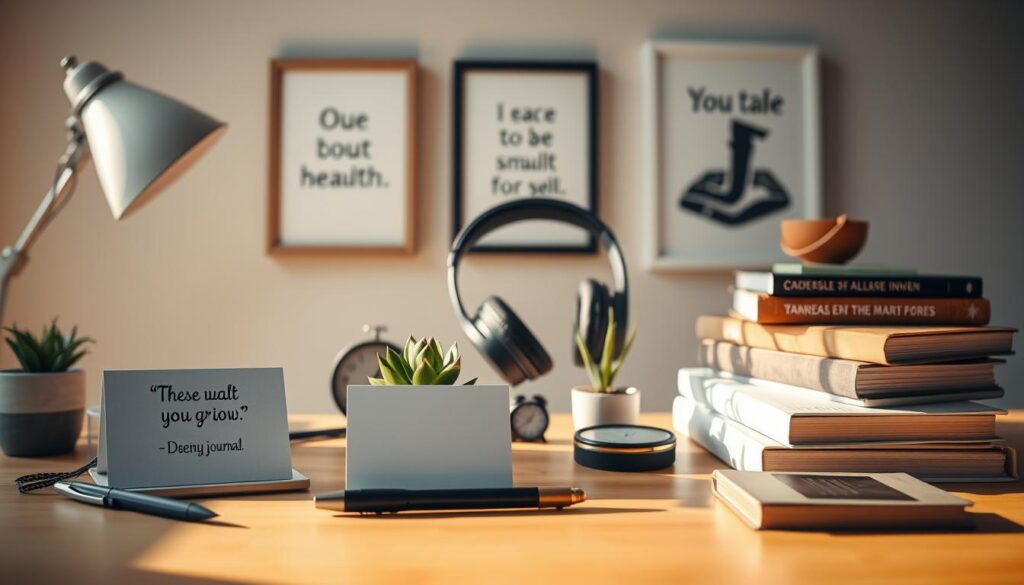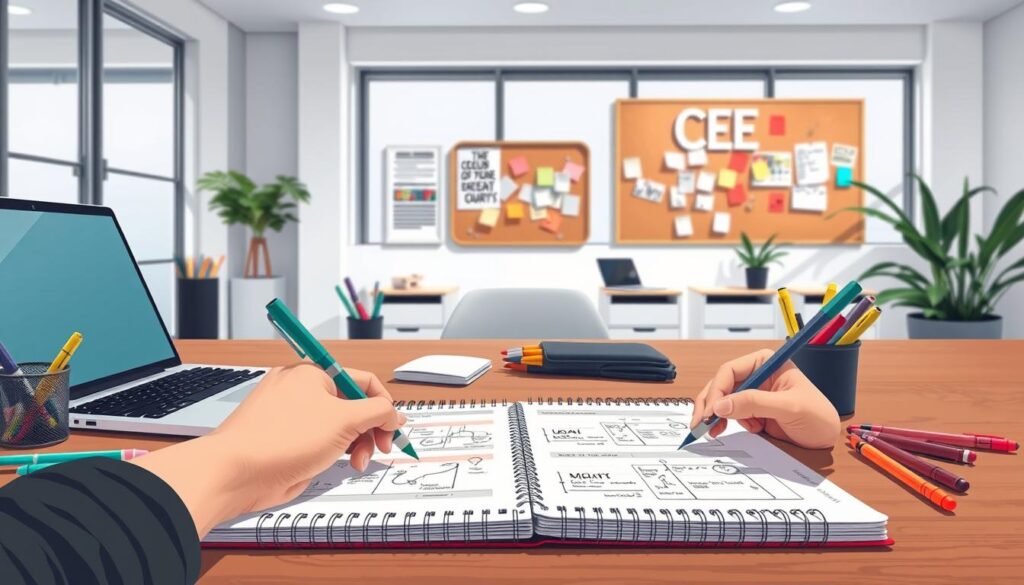Every journey starts with a single step. I remember when I realized my potential was not fixed. It was a landscape waiting to be explored. Personal development is not about sudden changes. It’s about finding simple tools for growth that slowly change our lives.
We often believe our abilities are set in stone. But I’ve learned that personal development tools can unlock incredible potential in each of us. The key is seeing growth as a journey, not a final goal.
My journey showed me that small, consistent actions lead to big changes. Simple tools for personal development are not complex strategies. They are practical, easy-to-use methods that anyone can use to make real changes.
Key Takeaways
- Personal growth is a continuous journey of self-discovery
- Small, consistent actions lead to significant transformations
- Everyone has untapped potential waiting to be developed
- Personal development tools are accessible to everyone
- Mindset plays a crucial role in personal growth
Understanding the Journey to Personal Growth
Starting your personal growth journey takes courage and self-awareness. Tools for personal development can change your life by showing you your strengths and weaknesses. I’ve found that the best self-improvement ideas come from being honest and dedicated.

Growth is not about being perfect; it’s about making progress. The first step in self-improvement is knowing where you stand today. This means looking honestly at your skills, challenges, and possibilities.
Defining Your Starting Point
Knowing where you are is key in personal growth. Think about these important areas:
- Personal skills and capabilities
- Emotional intelligence
- Professional achievements
- Personal relationships
Setting Realistic Growth Expectations
Setting too high goals can stop your self-improvement journey. Break your goals into smaller, achievable steps. Small, consistent progress is better than big, unattainable plans.
“The journey of a thousand miles begins with a single step” – Lao Tzu
The Power of Self-Assessment
Regular self-assessment is a vital tool for personal growth. Keep a personal growth journal to track your progress and reflect on your journey. This keeps you motivated and on track with your goals.
- Conduct monthly self-reviews
- Identify skill gaps
- Adjust strategies as needed
Breaking Through Mental Barriers and Limiting Beliefs

Unlocking your potential starts with recognizing mental barriers. Self-improvement ideas often begin by understanding deep-rooted beliefs that limit growth. These invisible obstacles can stop you from reaching your true capabilities.
Our minds are powerful tools that can either propel us forward or keep us stuck. Identifying limiting beliefs requires honest self-reflection and a willingness to challenge your existing thought processes.
- Recognize negative self-talk patterns
- Challenge irrational fears and doubts
- Reframe negative thoughts into positive opportunities
I’ve found that most mental barriers come from past experiences and learned behaviors. Fear of failure often stops people from taking risks and exploring new opportunities. By understanding these psychological blocks, you can unlock potential that has been dormant.
The biggest obstacle to personal growth is not external challenges, but the limitations we place on ourselves.
Practical strategies can help you break through these mental barriers. Start by practicing self-compassion and developing a growth mindset. Recognize that your abilities are not fixed and that you can continuously improve and develop new skills.
- Practice daily positive affirmations
- Seek out learning opportunities
- Surround yourself with supportive people
Your journey to self-improvement begins with understanding and overcoming mental barriers. Embrace the process of personal growth, and you’ll discover a world of untapped potential waiting to be explored.
Essential Simple Tools for Growth
Personal growth needs smart strategies and useful tools. My self-improvement journey showed me simple tools can change your path a lot. The right tools can unlock your potential and bring real change to your life.

Tracking your progress and setting goals becomes easier with the right tools. This makes personal development simpler.
Daily Reflection Practices
Daily reflection can change your personal growth. I suggest:
- Keeping a gratitude journal
- Spending 10 minutes each evening reviewing your day
- Writing down three key learnings or insights
Goal-Setting Frameworks
Setting goals effectively turns dreams into plans. My favorite method is:
- Creating SMART goals (Specific, Measurable, Achievable, Relevant, Time-bound)
- Breaking big goals into smaller steps
- Regularly reviewing and adjusting goals
Progress Tracking Methods
Tracking your growth keeps you motivated. Some great tools include:
- Digital tracking apps
- Monthly self-assessment spreadsheets
- Visual progress charts
“The secret of change is to focus all of your energy not on fighting the old, but on building the new.” – Socrates
Remember, these simple tools work best when used regularly and with true dedication to your growth.
Harnessing the Power of Habits for Personal Development

Habits shape our personal growth journey quietly. As someone who loves self-improvement, I’ve found that changing daily habits is key. Small, consistent actions can lead to big changes in our lives.
To create strong habits, we need a strategic plan. Here are some essential tools for personal development:
- Identify keystone habits that start positive changes
- Make clear, doable habit loops
- Use simple ways to track your progress
- Give yourself rewards for staying on track
The best self-improvement ideas focus on slow, lasting change. Trying to change too much at once can lead to burnout. Instead, focus on small habits that grow over time.
“Small shifts create significant momentum in personal growth.” – Anonymous
I break down big goals into daily practices. For example, spending 15 minutes each morning on learning or reflection can greatly boost your growth.
Building habits is a skill that takes time and effort. Be patient, keep practicing, and see your growth. Embrace the journey of continuous improvement, and watch your potential grow.
Building a Growth-Oriented Mindset
Having a growth mindset is a powerful way to unlock your potential. It helps you find simple ways to grow. Your mindset can change how you see challenges and personal growth.
A growth mindset isn’t about being naturally talented. It’s about believing you can get better with hard work and dedication. This view opens up endless learning and self-improvement opportunities.
Embracing Challenges as Opportunities
Challenges are not obstacles but chances for growth. When you face difficulties, ask yourself:
- What can I learn from this experience?
- How can this challenge help me improve?
- What skills am I developing right now?
Developing Resilience
Resilience is your inner strength that helps you recover from setbacks. To build resilience, try:
- Positive self-talk
- Setting realistic goals
- Managing your emotions
Cultivating Curiosity
Curiosity drives growth. Stay hungry for knowledge, ask questions, and seek new views. The more curious you are, the more chances you’ll find to unlock your potential.
“The capacity to learn is a gift; the ability to learn is a skill; the willingness to learn is a choice.” – Brian Herbert
Creating Your Personal Development Strategy

Creating a strong personal development strategy needs careful planning and knowing yourself well. I’ve found that the best self-improvement starts with a plan made just for you. This plan should match your goals and dreams.
Begin by looking at what you’re good at and where you can get better. Tools for personal growth can show you where to make big changes:
- Do a thorough check of your skills
- Look at how happy you are with your life now
- Set both short and long-term goals
- Think about what might get in your way
Your strategy should have clear, achievable goals. Break down big goals into smaller steps. This makes it easier to start and keeps you moving forward.
I suggest making a detailed plan that includes:
- Clear goals for personal growth
- Specific milestones and when to reach them
- Ways to stay accountable
- Regular checks on how you’re doing
Keep in mind, your strategy should change as you do. Stay open to making changes as you learn and grow.
Your personal development strategy is a living document – it grows and changes as you do.
Leveraging Resources and Support Systems
Personal growth isn’t a solo journey. I’ve found that using the right tools can speed up your growth. It’s all about finding the right resources and support that match your goals.

Personal development needs smart connections and tools. Here are some ways to build your support network.
Finding Mentors and Guides
Mentorship can change your growth journey. Here’s how to find them:
- Look for professionals in your field
- Go to industry networking events
- Use platforms like LinkedIn to connect
- Find people who share your dreams
“The right mentor can transform your perspective and accelerate your growth.” – Personal Development Expert
Using Digital Tools and Apps
Technology has amazing tools for growth. Some top ones are:
- Habit tracking apps
- Online learning platforms
- Meditation and mindfulness apps
- Goal-setting digital planners
Building a Supportive Network
Your environment shapes your potential. Building a growth-focused network is key. Surround yourself with people who challenge, inspire, and support your goals.
Remember, the right resources and connections can turn your personal growth dreams into reality.
Measuring Progress and Celebrating Success
![]()
Tracking your journey to unlock potential needs smart methods and a positive outlook. Self-improvement isn’t just about setting goals. It’s also about celebrating your growth.
I suggest making a personal progress tracking system. It lets you see your growth clearly. This turns abstract ideas into real milestones.
- Create a monthly reflection journal
- Use digital tracking apps for consistent monitoring
- Set quarterly review checkpoints
- Document both small and significant achievements
Celebrating success is not just about big wins. It’s about recognizing your effort in personal growth. Small victories build momentum and encourage positive habits.
“Progress is impossible without recognition of effort.” – Personal Development Wisdom
Make a reward system to motivate you. This could be treating yourself after reaching a goal or sharing your wins with friends who support your journey.
Remember, tracking progress is a personal and changing process. Your method should be flexible, encouraging, and match your unique goals.
Overcoming Setbacks and Staying Motivated
Personal growth isn’t always easy. Setbacks are a normal part of the journey. Learning to bounce back stronger is key.
When you hit obstacles, try these strategies:
- See setbacks as chances to learn
- Be kind to yourself when things get tough
- Break big challenges into smaller steps
- Keep a positive outlook on growth
Simple tools can keep you motivated. A journal helps track your progress and emotions. Digital apps show your growth visually.
“Failure is not the opposite of success; it’s part of success.” – Arianna Huffington
Motivation changes. Having a support network helps when you’re low. People who get your goals can boost your enthusiasm.
Building mental strength takes effort. See every challenge as a chance to grow. Your journey is about learning and adapting, not being perfect.
Integrating Personal Growth into Daily Life
You don’t need to change your whole life to grow. Small, steady steps can make personal growth a part of your daily routine. I’ve found that making self-improvement ideas easy and natural helps a lot.
To unlock your potential, try these simple strategies:
- Create a morning routine for personal growth
- Use commute or waiting times for learning
- Set small daily goals for growth
- Use simple apps to track your progress
Micro-learning has changed how I improve myself. Listening to educational podcasts while working out, reading short articles at lunch, or watching quick videos can help. It expands your knowledge without taking up too much time.
“Growth is not a one-time event, but a continuous process integrated into daily life.”
The trick is to build habits that naturally include personal growth. Start small, stay consistent, and see how these small changes can lead to big improvements in your life.
- Choose activities that interest you
- Be patient with your progress
- Celebrate your small victories
Remember, personal growth is about making steady, intentional progress. It’s not about being perfect.
Conclusion: Embracing Lifelong Growth and Development
Personal growth is a journey that needs commitment and ongoing exploration. I’ve learned that growth isn’t about reaching a goal. It’s about keeping an open mind to learn and improve.
Every small step we take can lead to big changes. The tools for personal growth I’ve talked about help unlock our potential. They show us that growth is a gradual process.
By using these tools, we can grow in a way that fits our lives. This means learning, reflecting, and setting goals. It helps us evolve in a way that changes with our lives.
Your journey of growth is your own. There’s no one-size-fits-all approach. Trying out different tools is key. Stay curious and patient with yourself.
Remember, growth is not just about moving forward. It’s about learning and discovering ourselves. The tools and strategies we discussed are just the beginning. Your dedication and resilience will shape your growth path.




